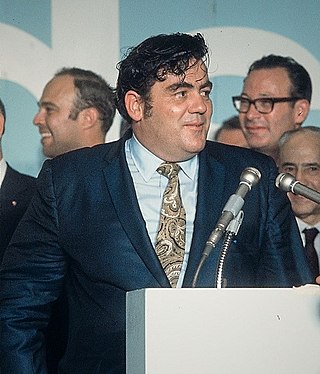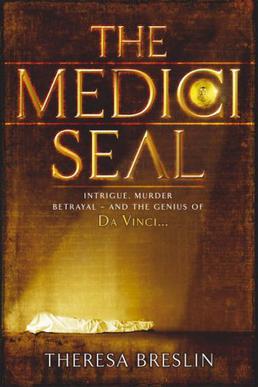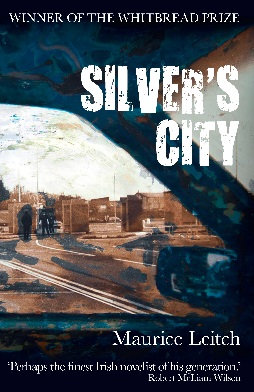
James Earle Breslin was an American journalist and author. Until the time of his death, he wrote a column for the New York Daily News Sunday edition. He wrote numerous novels, and columns of his appeared regularly in various newspapers in his hometown of New York City. He served as a regular columnist for the Long Island newspaper Newsday until his retirement on November 2, 2004, though he still published occasional pieces for the paper until his death.

Sectarianism in Glasgow takes the form of long-standing religious and political sectarian rivalry between Catholics and Protestants. It is particularly reinforced by the fierce rivalry between Celtic F.C. and Rangers F.C., the two largest Scottish football clubs sometimes referred to as the Old Firm, whose support base is traditionally predominantly Catholic and Protestant respectively. A 2003 report for Glasgow City Council indicated that people clearly believe "sectarianism is still prevalent in Glasgow", but that members of the public were divided on the strength of the relationship between football and sectarianism.

"Billy Boys", also titled "The Billy Boys", is a loyalist song from Glasgow, sung to the tune of "Marching Through Georgia." It originated in the 1920s as the signature song of one of the Glasgow razor gangs led by Billy Fullerton and later became viewed to reflect the long-running sectarian religious hatred directed by some Protestants against Catholics in the city. It is associated in particular with Rangers F.C.
Graham Spiers is a Scottish sports journalist who writes for the Scottish edition of The Times newspaper. He has won Scotland's Sports Journalist of the Year award four times.

Theresa Breslin is a Scottish author. Winner of the 1994 Carnegie Medal. Breslin is the author of over 50 books. She is an Honorary Fellow of the Association for Scottish Literary Studies.

Faith Erin Hicks is a Canadian cartoonist and animator living in Vancouver, British Columbia.
Unity is a volunteer-run organisation which provides support for asylum seekers and sans papiers in Glasgow, Scotland. The Unity Centre has been open since 2006 and is situated in Ibrox, near to the Home Office Immigration Centre.
Linden Dalecki is an American author. He writes novels for children and young adults.

Running on Empty is the 36th young adult novel in the long running and successful Hardy Boys casebook series for boys written by Franklin W. Dixon. It was first published by Simon Pulse in 1990. In it The Hardy Boys investigate the disappearance of their friend, Chet Morton, and go undercover.

The Medici Seal is a 2006 young adult novel written by Theresa Breslin. Set among the cultural life and political intrigues of Renaissance Italy, it is the story of a boy who initially calls himself Matteo and his master Leonardo da Vinci.

The Glasgow razor gangs were violent gangs that existed in the East End and South Side of Glasgow, Scotland in the late 1920s and 1930s and were named after their weapon of choice. H. Kingsley Long's novel No Mean City (1935) contains a fictionalised account of these gangs.

Karen Campbell is a Scottish writer of contemporary fiction. Her first four novels, while billed as police procedurals, form a quartet set in Glasgow which goes behind the uniform, to examine the lives of people who just happen to be police officers, and feature Sgt. Anna Cameron and Cath and Jamie Worth. Her fifth novel, published in 2013, breaks away from the world of the police. It tells the story of Abdi, a Somali asylum-seeker newly arrived in Glasgow with his young daughter, and of recently widowed Deborah, who has been assigned as mentor to help them settle in. The novel was selected as the BBC Radio Four Book at Bedtime in April 2013. Now published by Canongate, Campbell has written eight novels, the most recent being Paper Cup, which follows the journey of homeless woman Kelly.

Orange walks, or Orange marches, are a series of parades by members of the Orange Order and other Protestant fraternal societies, held during the summer months in various Commonwealth nations, and most notably across Northern Ireland. The parades typically build up to 12 July celebrations marking Prince William of Orange's victory over King James II and VII at the Battle of the Boyne in 1690.
Events from the year 2005 in Scotland.
Events from the year 1994 in Scotland.

Rangers Football Club is a Scottish football club based in the city of Glasgow.
Between the 1930s and 1970s, the Scottish football club Rangers had an unwritten rule whereby the club would not knowingly sign any player who was a Roman Catholic. This was because Rangers were viewed as a Protestant, Unionist club, in contrast to their Old Firm rivals, Celtic who were viewed as an Irish Catholic club, although Celtic never adopted a similar signing policy. Rangers' policy was ended in 1989 when they signed ex-Celtic striker Mo Johnston, under manager Graeme Souness.

The Glasgow Magdalene Institution was an asylum in Glasgow, Scotland, initially started in 1812 and was open until 1958.

Silver's City is a 1981 novel by Northern Irish author Maurice Leitch. It won the 1981 Whitbread Book Award for novel of the year and in 2017, on its republication by Northern Ireland's Turnpike Books, was described by his publisher as the "begetter of Northern noir". "Northern noir", also known as Ulster noir, is the Northern Ireland equivalent of Scandinavian Nordic noir, a distinct genre of crime fiction.
Brigid Arthur, csb, also known as Marie Brigid Arthur, and Marie Therese/a Arthur, is an Australian Brigidine sister, educator, refugee advocate and activist on social issues.













